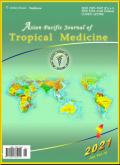马来西亚中年人的心血管健康意识、风险认知、行为意向和 INTERHEART 风险分层
IF 1.9
4区 医学
Q3 PUBLIC, ENVIRONMENTAL & OCCUPATIONAL HEALTH
引用次数: 0
摘要
调查马来西亚中年人群的心血管健康意识、风险认知、行为意向和 INTERHEART 风险分层之间的相互关系。 在 2022 年 11 月和 2023 年 1 月期间进行了一次方便抽样的横断面调查。受访者填写了经过验证的问卷,以评估心血管健康意识、对心血管疾病的风险认知、养成健康习惯的行为意向以及基于既定风险因素的 INTERHEART 风险分层评分(IHRS)。共有 602 名受访者被纳入最终分析。数据分析采用独立 t 检验/单因素方差分析或 Mann- Whitney/Kruskai-Wailis 检验来检验差异,采用皮尔逊相关或线性回归检验来分析自变量和因变量之间的关联。 心血管疾病相关医学知识与心血管疾病风险预防知识、风险认知、行为意向和 IHRS 之间存在明显的正相关(P<0.05,Pearson 相关性)。值得注意的是,IHRS 越高的人对心血管疾病和心血管疾病风险预防的相关知识、风险认知和行为意向的了解程度越低。男性、劳动者、积极/曾经吸烟者、家庭收入和教育水平较低者、从事与医疗保健行业无关的职业者、未收到心血管疾病健康手册或不了解健康自我评估工具者,可能对心血管健康的知识水平、风险认知和行为意向较低(P<0.05,单因素方差分析)。而教育水平、吸烟状况、对心血管疾病海报的认识、自我评估工具则与心血管疾病和心血管疾病风险预防知识、风险认知、行为意向和/或 IHRS 反复显著相关(P<0.05,线性回归)。 这些发现强调了在中年人中提高心血管健康意识和风险认知以促进积极的生物统计学并降低心血管疾病风险的重要性。针对 INTERHEART 确定的特定风险因素进行有针对性的干预,可提高风险分层的准确性,促进有针对性的预防策略。本文章由计算机程序翻译,如有差异,请以英文原文为准。
Cardiovascular health awareness, risk perception, behavioural intention and INTERHEART risk stratification among middle-aged adults in Malaysia
To investigate the interrelationship between cardiovascular health awareness, risk perception, behavioural intention, and INTERHEART risk stratification in a middle-aged adult population in Malaysia.
A cross-sectional survey with convenience sampling was conducted during November 2022 and January 2023. Participants completed validated questionnaires assessing cardiovascular health awareness, risk perception of cardiovascular diseases, behavioural intention towards adopting healthy habits, and INTERHEART risk stratification score (IHRS) based on established risk factors. A total of 602 respondents were included in the final analysis. Data were analysed with independent t-test/one-way ANOVA or Mann- Whitney/Kruskai-Wailis to test the differences, Pearson correlation or linear regression test to analyze the association of independent and dependent variables.
There was a significant positive correlation between medical knowledge related to cardiovascular disease (CVD) and knowledge related to CVD risk prevention, risk perception, behavioural intention and IHRS (P<0.05, Pearson correlation). Notably, individuals with higher IHRS tended to have lower knowledge related to CVD and CVD risk prevention, risk perception, and behavioural intention. Males, laborers, active/former smokers, individuals with lower household income and educational levels, those involved in occupations not related to the healthcare sector, and those who did not receive the CVD health brochure or are unaware of health self-assessment tools are likely to have lower levels of knowledge, risk perception, and poorer behavioural intention regarding cardiovascular health (P<0.05, one-way ANOVA). While educational level, smoking status, awareness about CVD poster, self-assessment tools were repeatedly significantly associated with knowledge related to CVD and CVD risk prevention, risk perception, behavioral intention and/or IHRS (P<0.05, linear regression).
These findings underscore the importance of promoting cardiovascular health awareness and risk perception among middle-aged adults to foster positive BI and reduce CVD risk. Tailored interventions targeting specific risk factors identified by INTERHEART may enhance risk stratification accuracy and facilitate targeted preventive strategies.
求助全文
通过发布文献求助,成功后即可免费获取论文全文。
去求助
来源期刊

Asian Pacific journal of tropical medicine
PUBLIC, ENVIRONMENTAL & OCCUPATIONAL HEALTH-TROPICAL MEDICINE
CiteScore
4.00
自引率
9.70%
发文量
1936
审稿时长
3-8 weeks
期刊介绍:
Asian Pacific Journal of Tropical Medicine (ISSN 1995-7645 CODEN: APJTB6), a publication of Editorial office of Hainan Medical University,is a peer-reviewed print + online Monthly journal. The journal''s full text is available online at http://www.apjtm.org/. The journal allows free access (Open Access) to its contents and permits authors to self-archive final accepted version of the articles on any OAI-compliant institutional / subject-based repository.
APJTM aims to provide an academic communicating platform for international physicians, medical scientists, allied health scientists and public health workers, especially those of the Asia-Pacific region and worldwide on tropical medicine, infectious diseases and public health, and to meet the growing challenges of understanding, preventing and controlling the dramatic global emergence and re-emergence of infectious diseases in the Asia-Pacific.
The journal is proud to have an international and diverse editorial board that will assist and facilitate the publication of articles that reflect a global view on tropical medicine, infectious diseases and public health, as well as emphasizing our focus on supporting the needs of public health practitioners. The APJTM will allow us to seek opportunities to work with others who share our aim, and to enhance our work through partnership, and to uphold the standards of our profession and contribute to its advancement.
 求助内容:
求助内容: 应助结果提醒方式:
应助结果提醒方式:


